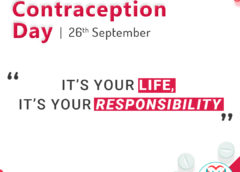World Contraception Day takes place on September 26th every year. The annual worldwide campaign centers around a vision where every pregnancy is wanted. Launched in 2007, WCD’s mission is to improve awareness of contraception and to enable young people to make informed choices on their sexual and reproductive health.
When is it Celebrated?
World Contraception Day is observed on 26th September every year.
History of World Contraception Day
World Contraception Day was first observed on 26th September in 2007 by ten international family planning organizations to raise awareness about contraception and to enable couples to make an informed decision regarding starting a family, so that every pregnancy is wanted. The WCD promotes family planning and contraceptive methods that are safe and preferred. World Contraception Day is supported by a coalition of 15 international NGOs, governmental organizations, and scientific and medical societies with an interest of spreading the right knowledge about sexual and reproductive health.
Myths about Contraception You Should Know
When it comes to contraception, there may be a lot many doubts in the minds of people looking to use it for the first time. These doubts may emerge from the fact that most Indian schools lack sex education classes. As such, people either refer to and get misled by online information, or end up in a doctor’s office.
There are some myths regarding the Contraceptives.
Myth 1 — Contraceptives cause cancer
Fact: Oral contraceptive pills actually reduce the risk of ovarian and endometrial (inner lining of the uterus) cancer, and hence are considered to be protective. Some association may exist between the pills and breast cancer. It would be best to consult your doctor for thorough guidance before beginning a pill.
Myth 2 — Condoms provide 100 per cent protection from unwanted pregnancy
Fact: Condoms can give only 80 per cent protection, which means that 2 out of 10 couples using condoms can end up with a pregnancy. Same holds true for ‘safe period’ and ‘withdrawal method’. Condoms, however, do protect against Sexually Transmitted Diseases (STDs).
Myth 3 — If I take pills now, I may never get pregnant in the future
Fact: Oral contraceptive pills or combined oral contraceptives, are effective only when the woman is taking them regularly. As soon as she stops the pills, she can get pregnant.
Myth 4 — Weight gains because of the pills
Fact: There is no substantial weight gain due to taking contraceptive pills; a woman may put on weight for many other reasons. In fact, the pills can potentially reduce menstrual bleeding and menstrual cramps. They also improve complexion and reduce facial hair and acne. Importantly, the pills help to control Polycystic Ovarian Syndrome (PCOS) and endometriosis.
Myth 5 — Contraception is a woman’s problem
Fact: Just like how planning a pregnancy is a decision made jointly by a couple, contraception also requires couples to work as a team. The couple needs to figure out which method is most suitable for them; a gynaecologist can help them in this process.
Reference: https://indianexpress.com/article/lifestyle/health/world-contraception-day-2020-a-doctor-debunks-five-myths-6610615/

Leave a Reply
You must be logged in to post a comment.